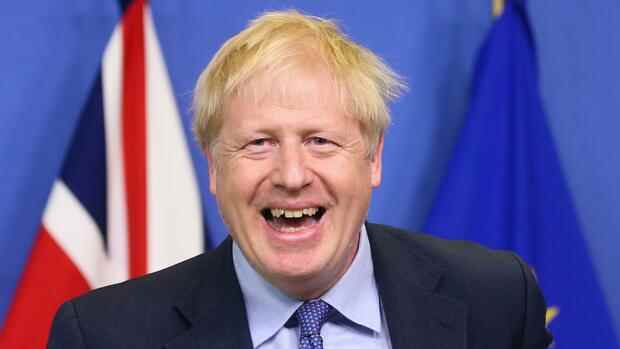Boris Johnson, Prime Minister of Great Britain, wants to unilaterally withdraw from the Northern Ireland Protocol of the Brexit Treaty if necessary.
(Photo: dpa)
The British government has often threatened to unilaterally withdraw from the controversial Northern Ireland protocol of the Brexit treaty. London could mean business this time. The victory of the nationalists in the Northern Irish provinces in the regional elections and the worsening crisis surrounding the sharp rise in the cost of living are putting Prime Minister Boris Johnson’s government under enormous pressure to act.
In Brussels, the threats from London are still considered a new bluff by Johnson in the power game about the pros and cons of Brexit. The EU strictly opposes renegotiating the Northern Ireland Protocol and is prepared to launch a trade war if London breaks the withdrawal agreement.
If British Foreign Secretary Liz Truss and Vice President of the EU Commission Maros Sefcovic do not agree on a compromise at the last minute, the worst political earthquake in the English Channel since the 2016 Brexit referendum could occur as early as next week.
However, the world has changed fundamentally in the past six years. Europe is facing military aggression from Russia’s President Vladimir Putin, who is just waiting for internal squabbles to shatter European unity.
Top jobs of the day
Find the best jobs now and
be notified by email.
The Ukraine war has highlighted the importance of Britain and the EU forming a common front on foreign and security policy issues. Given the common threat posed by Putin’s Russia, escalating the Northern Ireland dispute would be an anachronism that neither London nor Brussels can afford. For this reason, US President Joe Biden is now urging both sides to be more willing to compromise.
Heavy goods vehicles await inspection at the Department for Agriculture, Environment and Rural Affairs inspection post at the Belfast docks.
(Photo: dpa)
That is entirely possible, as the dispute over the Northern Ireland Protocol does not appear intractable. The protocol provides for a customs border for goods traffic between Northern Ireland and the rest of Great Britain in the Irish Sea to avoid a hard and politically sensitive border between the province and the Republic of Ireland. Both sides have agreed on this in the Brexit Treaty, which is binding under international law.
London is now invoking Article 16 of the Northern Ireland Protocol, which allows some provisions of the agreement to be overridden in the event of “serious economic, social or environmental difficulties”. What is meant by this is a considerable amount of bureaucracy and not inconsiderable costs for freight transport between Northern Ireland and the rest of the kingdom.
Politically, however, Johnson also wants to reassure the unionists in the provinces, who feel left alone by London and fear a creeping reunification of Ireland after the nationalists’ election victory.
Peace in Northern Ireland is still fragile
The EU has already accommodated the British on many practical issues and announced in October 2021 that it would eliminate around 80 percent of the previous border controls. London doesn’t go far enough.
>>> Read here: Forming a government, Brexit dispute, reunification: These tasks await Northern Ireland’s election winner
As important as such detailed questions are, in the context of global political turmoil, they must not lead to the rift between Great Britain and the EU becoming even larger. This is primarily a reminder to Johnson, who likes to present himself as the leader of the West but often acts like a political gambler. However, it is also of little help if Brussels insists on its legalistic point of view instead of helping even more to solve the practical problems.
Both sides also underestimate the fact that they are handling political dynamite here. Peace in Northern Ireland is still fragile 24 years after the Good Friday Agreement. It would therefore also be extremely negligent to make the province a pawn in a showdown over the fundamental question of whether Brexit was right or wrong.
More: Prosperity through Brexit 2.0 – Johnson wants even more distance to Europe
